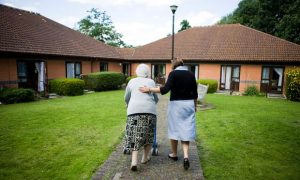Thousands of patients to get personalised NHS budgets
Hundreds of thousands of people with mental health conditions and physical disabilities could be given the option of a personalised NHS budget for their own care needs under government proposals.
People with learning difficulties and dementia are among around 350,000 who could have the right to select and pay for treatments that improve their health and wellbeing through a bespoke care plan agreed with medical professionals. For children and people unable to manage the money, parents or carers will be able to manage the budget.
Ministers believe the measure will improve patient satisfaction with the NHS and harmonise health and social care budgets. Currently, about 23,000 people have personalised NHS budgets, but ministers want to expand the scheme.
The government hopes that care provided to the qualifying groups on the NHS will improve, after complaints about current standards of treatment. Tens of thousands of pounds could be made available to a single person. People who qualify for the personal healthcare budget would have the option of receiving the money through a direct payment, giving the money to a third party to manage or leaving it with the NHS to control.
The move has received the backing of the health secretary, Jeremy Hunt, and Simon Stevens, the head of the NHS. It will be set up later this year when the government announces changes to health and social care.
Caroline Dinenage, the minister for care, said: “If you have complex needs, our current health and social care system can be confusing, so it’s right people should be involved in the important decisions about how their care is delivered.
“These changes will put the power back into the hands of patients and their families, potentially allowing up to 350,000 extra people to take up a personal health budget if they so wish.â€
One example of the existing NHS scheme mentioned in the government consultation is of a 90-year-old woman with Alzheimer’s disease who uses the personal health budget to pay for care at home, osteopathy treatment and respite care for her family. The woman has not had any emergency admissions to hospital or nursing home since she was given the personal budget, according to the report.
Dinenage said: “This would not only improve quality of life and the care they receive, it will offer good value for money for the taxpayer and reduce pressure on emergency care by joining up health and social care services at a local level.
“As the health and social care secretary set out in his speech last month, we’re determined to focus care around the person, and this will form one of the key principles of reform for the sector in a green paper published this summer.â€
However, Caroline Abrahams of Age UK told the Times: “Older people in declining health with social care needs generally tell us they are not very interested in getting involved in organising the services they receive. They just want them to be effective and joined up, and delivered by kind and skilful professionals.â€
